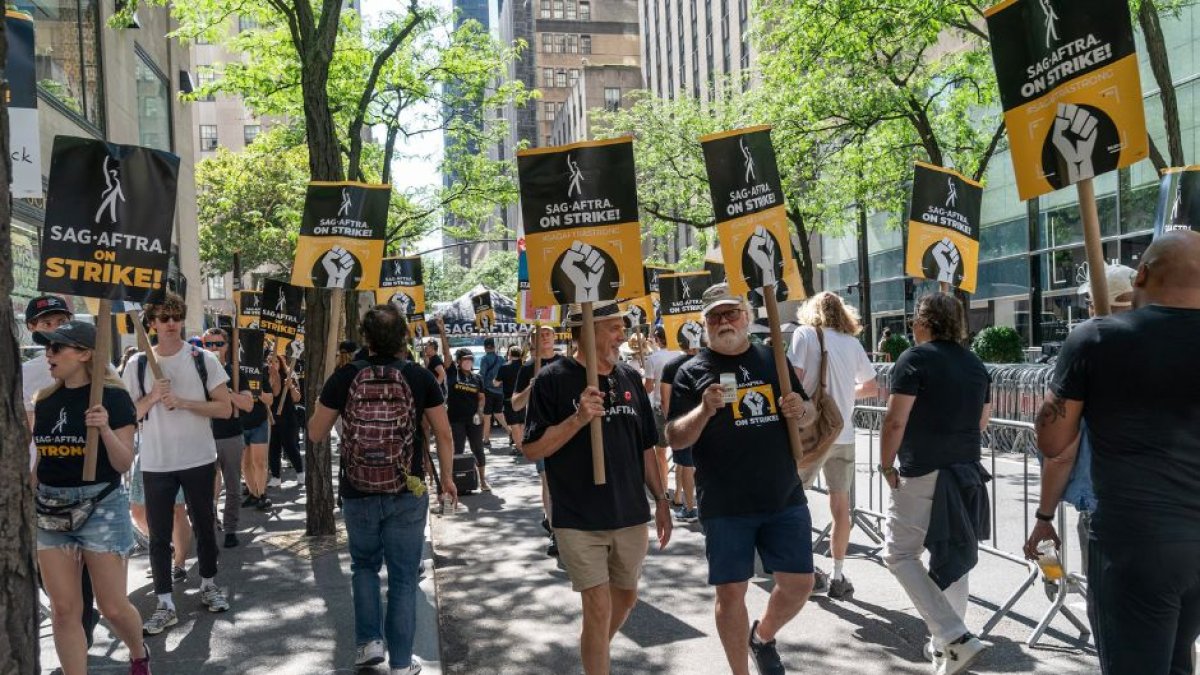Losses of $150 million per week: Hollywood's double strike in numbers
The two strikes may cost the country an estimated $4 billion, according to Forbes.

(Cordon Press)
Hollywood is facing a crisis. The double strike initiated by the screenwriters in May, which was joined by the actors on July 13 affects not only the Writers Guild (WGA), the Screen Actors Guild (SAG-AFTRA) and the Alliance of Motion Picture and Television Producers (AMPTP) but, little by little, has begun to harm the entire county. In fact, the strike could cost the country $150 million per week. Finty's financial advisor, Andrew Boyd, provided this weekly estimate to Forbes.
Forbes estimates that the strike in Hollywood could cost the United States $4 billion in losses. It is true that some cities and states have been more affected than others. Deadline reported in May that in California, where Hollywood is located, the screenwriters' strike alone costs the state around $30 million a day. Now, with the actors union on strike, which has practically paralyzed the entire sector, the figure has multiplied.
Hollywood also brings major benefits to Georgia and New York
In Georgia, said Axios, film and television productions contributed $4.4 billion to the state during the 2022 fiscal year. In New York City the loss is also significant, as a City Hall spokesperson told the newspaper, "The film and television industry represents 6.5% of New York City's GDP and employs more than 185,000 New Yorkers."
The figure is getting worse. The Motion Picture Association reported on its web page that every year, the audiovisual industry pays more than $186 billion in annual salaries that affect 2.4 million people who work in the industry as makeup artists, writers, set designers, actors, directors, screenwriters and more. They collaborate extensively in the local economies where they also contribute significant amounts of money:
Major donors to SAG-AFTRA
The actors are some of the major victims of the strike since they cannot resume their projects or attend premieres, press conferences or be interviewed to promote their movies, series or television programs, both large and small.
Fortunately, Hollywood stars have rallied and celebrities such as George Clooney, Meryl Streep, Matt Damon, Leonardo DiCaprio, Hugh Jackman, Nicole Kidman, Jennifer Lopez and Ben Affleck, Ryan Reynolds and Blake Lively, Arnold Schwarzenegger, Julia Roberts and Oprah Winfrey have each donated $1 million to the cause. Dwayne Johnson also made a generous "seven-figure" donation to the Screen Actors Guild although the exact number has not been disclosed.
Courtney B. Vance, the president of the SAG-AFTRA Foundation, revealed that they have raised approximately $15 million. In fact, she said in statements reported by Deadline, that the union has received several important donations:
Cameo, an alternative way for actors to make money while on strike
While the big stars are making donations, other lower-caliber performers have found a substitute so they can earn some money while the strike lasts: Cameo.
According to The New York Times, many stars have turned to the app as an alternative way to make an income. Fans pay them to record personalized video messages, wish them a happy birthday or give them some good news. They can make good money from it too.
For example, actress Alyssa Milano charges $250 for a video message. She explained that she started on the app as a way to make some extra cash during the strike: "It's a great way to supplement some income during this idle time," she said.
She is not the only one using this service. "American Horror Story" actor Cheyenne Jackson also recently joined the app and even Actors Guild President Fran Drescher also reactivated her account, although she is not accepting bookings at this time.
SAG-AFTRA's national director of strategic contract initiatives and podcasts, Sue-Anne Morrow said that although it's a small activity, it can be done without violating the regulations in force for actors during the strike: "As long as there’s no promotion of struck work within Cameo, there’s no problem," she explained, making it clear that, as long as there is no talk of movies, series or television programs, the actors may as well use Cameo to earn extra money.

























